Compilers play an important role in the development of modern software and systems. They’re computer programs that transform source codes into binary executables. When you write a program using a high-level language such as C or Pascal, you need the compiler to interpret your code and turn it into a machine-readable binary.
Usually, modern Linux IDEs take care of this using in-built compiler frontends. On the other hand, many systems programmer like me writes their code using a simple editor and compile the program using the appropriate Linux compilers.
Since Linux offers a plethora of compelling compilers, we’ve curated this guide to help you choose the best one for your needs.
Powerful Linux Compilers
Compilers are used for turning programs written in compiled language into executables. Interpreted languages like Python and Perl don’t require us to compile the code since programs written in these languages are executed inside a standalone runtime.
However, compiled languages offer exceptional performance and are thus used for building advanced applications such as your favorite Linux distros.
1. GCC
The GNU Compiler Collection, or GCC, is, without any doubt, the most powerful compiler. It is a cornerstone of the open-source GNU platform and has been used to build almost every modern machine in one way or another.
GCC offers a suite of compilers for standard compiled languages, including C, C++, Objective C, Ada, Pascal, Fortran, and many more. Most Linux distributions should have GCC installed by default. It supports both the ANSI C and the K&R variant. If you’re a starting programmer, stick with GCC.

Features of GCC
- GCC is known for its portability and can produce executables for a wide range of platforms, including most ARM-based embedded devices.
- It implements robust link-time optimization techniques for speeding up the output binary by a significant factor.
- GCC is extremely extendable and allows developers to use custom plugins to add newer functionalities as required by the project.
- It is written using C++ and provides support for fast enumeration, protocol methods, cross-compilation, class extensions, and so on.
2. AOCC
The AOCC or AMD Optimizing C/C++ Compiler is a free but compelling optimization compiler for 32-bit and 64-bit Linux AMD platforms. It’s a specialized compiler that allows developers to utilize the most performance out of their latest CPUs.
This is one of the best Linux compilers for game developers due to its vast array of optimization capabilities. Moreover, AOCC is an open-source project. So, developers can view the source for a better understanding of the underlying workings.
Features of AOCC
- AMD Optimizing C/C++ Compiler is specifically tuned for the AMD 17h processor family and provides better optimization for the AMD EPYC 7xx2-series.
- This compiler is written using the Fortran language and is tested on Ubuntu 18.04, Ubuntu 19.04, and Red Hat Enterprise Linux.
- It provides binary installations for both Debian and RPM-based systems and also allows installation from the source.
- This is the best optimization compiler for Linux users who possess modern AMD Ryzen-based microprocessors.
3. Intel C++ Compiler
The Intel C++ Compiler is an extremely powerful proprietary compiler that runs seamlessly on Linux and other Unix-based machines. It is essentially a compiler suite with the ability to produce high-performance executables using advanced techniques and hardware optimizations.
Also known as ICC, this modern-day compiler is aimed at professionals working in high-availability computing and game development. Developers can quickly write code that takes advantage of additional cores available in Intel-based Linux environments.

Features of Intel C++ Compiler
- Intel C++ Compiler can be easily integrated with traditional IDEs, including Eclipse, Visual Studio, Xcode, and Android Studio.
- Developers can heavily optimize programs written for various Intel families, such as Intel Core, Atom, and Xeon-based microprocessors.
- Intel C++ Compiler provides exceptional support for SIMD parallelization with tools like the SIMD Data Layout Template library.
- This Linux compiler supports OpenMP programming models, lambda improvements, embedded applications, and the Intel® VTune™ Profiler.
4. LLVM
The Low-Level Virtual Machine, or LLVM, is a collection of compiler technologies that offers powerful libraries and tools for creating compilers and optimizers. It’s a sophisticated project used by many modern compilers, such as the AMD Optimizing C/C++ Compiler.
The simple design principle of LLVM makes it easy to understand for beginners while still providing the tools required for creating advanced development tools. Moreover, LLVM offers excellent support for a wide range of architecture, including X86, X86-64, ARM, MIPS, and PowerPC.
Features of LLVM
- It provides very stable online and offline code representations alongside readers and writers for assembly & bytecode.
- The LLVM Clang project allows compelling frontends for C, C++, Fortran, and Objective C based on the GCC 4.2 parsers.
- LLVM offers powerful Just in Time(JIT) compilations alongside a C-based backend for building target-specific native codes.
- It also offers an outstanding profiling system for optimization, a testing framework, a life-long compilation model, and robust debugging tools for Linux.
5. Netwide Assembler
Netwide Assembler, or NASM, is an extremely powerful assembler and disassembler for Intel x86 machines. It runs on all major Linux distributions as well as on Windows and Mac OS.
NASM is widely considered the best Linux assembler due to its rich feature set and ease of use. It is being maintained actively and is used in a lot of areas. If you’re looking for the best assembler for your x86 Linux system, we suggest you go with NASM.
Features of Netwide Assembler
- It can be used for assembling outputs in several formats, such as ELF, Mach-O, a.out, COFF, OMF, and other binary files.
- The free and open-source BSD 2-clause license of this assembler makes NASM extremely easy to modify or customize.
- NASM can be used for re-targeting programs to almost any x86 system due to its wide array of output formats.
- It can generate automatic segment overrides, create flat binaries, write ROM images, and Linux boot loaders.
6. GFortran
GFortran or GNU Fortran is a full-fledged Fortran compiler frontend based on GCC. It is a FOSS project that offers a plethora of robust functionalities, including great debugging features and support for legacy codebases.
GFortran is compatible with Fortran 95 while also offering most features of Fortran 2003 and Fortran 2008. Additionally, the open-source nature of this project encourages developers to extend the compiler code themselves.
So take a look at GFortran if you’re working with Fortran for either personal projects or maintaining legacy enterprise products.
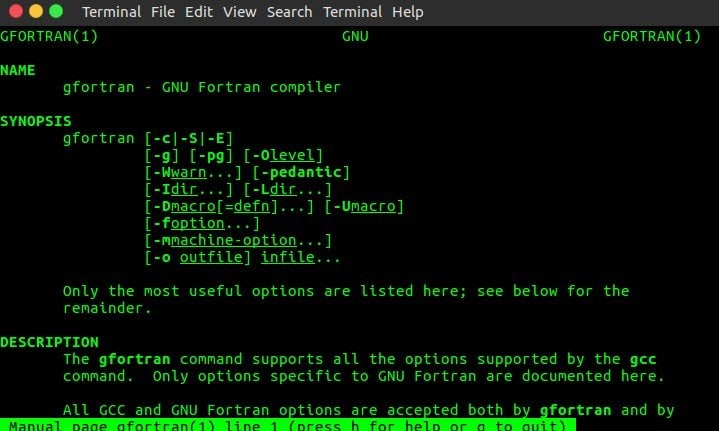
Features of GFortran
- GFortran is developed to replace the historical g77 Fortran compiler and ensures the successful compilation of all legacy g77 code.
- It is known for its reasonable compilation speed and the ability to compile codes developed for a different machine.
- GFortran provides seamless compilation accuracy and maintains a handy Linux ticketing system for fixing or outlining bugs.
- This Fortran compiler is very well maintained and rolls out newer features as well as bug fixes pretty often.
7. GHC
GHC, or the Glasgow Haskell Compiler, is a free but powerful native code compiler for the Haskell programming language. It is available on all X86, X86-64, and ARM-based machines and supports Linux alongside traditional Unix systems.
Haskell is a compelling functional programming language that is gaining tremendous momentum due to its advanced feature set. GHC is one of the best Linux compilers for Haskell programmers and offers everything required for building modern-day research and industrial projects.
Features of GHC
- GHC implements a cross-platform system that enables developers to write and test Haskell programs in a formidable manner.
- This Haskell compiler supports a massive list of libraries, extensions, and optimization techniques for speeding up large-scale applications.
- GHC can generate faster codes for concurrent programs and supports various parallelization techniques like Software Transactional Memory (STM).
- It is very portable and can be used for generating C code as an intermediate target for a different platform.
8. Tiny C Compiler
The Tiny C Compiler is a small but extremely efficient C compiler developed by Fabrice Bellard. It is built for older hardware with various resource constraints.
Tiny C Compiler is written using a combination of C and assembly, which reduces the compiler’s overall memory footprint and makes it an ideal choice for small, embedded platforms.
It is a cross-platform compiler that runs seamlessly in Linux, BSD, and Windows operating systems. We suggest this compiler to developers working on projects with limited CPU resources.
Features of Tiny C Compiler
- Tiny C Compiler supports all features of ANSI C (C89/C90) as well as most of the C99 ISO standard alongside traditional GNU extensions.
- It is very lightweight at around 100 KB and can be run within systems that have as low as 1.44 MB of free memory space.
- The convenient command-line switch enables developers to run programs automatically at compile-time and within Linux shell scripts.
- Tiny C Compiler can be run on X86, X86-64, and ARM-based devices and compiles almost nine times faster than GCC.
9. Free Pascal Compiler
The Free Pascal Compiler or FPC is a simple and efficient compiler for Pascal and Object Pascal. It supports all major operating systems as well as 16, 32, and 64-bit machines. FPC is an open-source software, so developers can view the source and make modifications without any problem.
This helps programmers to write more optimized codes and reduce the runtime of older, legacy applications. Moreover, Free Pascal Compiler is one of the best Linux compilers for programming retro game emulators, such as Nintendo NDS and Game Boy Advance.
Features of Free Pascal Compiler
- Free Pascal Compiler takes a “write once, compile anywhere” approach, which enables developers to write more flexible codes.
- The Lazarus integrated development environment (IDE) provides an excellent graphical interface to this Pascal compiler.
- It can successfully generate LLVM Bitcodes for several platforms, including x86-64, AArch64, and ARMHF.
- The official website provides excellent documentation to help beginners get started with Free Pascal Compiler.
10. Babel
Babel is a compelling, modern-day compiler for JavaScript. It is a feature-rich compiler used to transpile ECMAScript 2015+ code into an older but backward-compatible version of JavaScript. This is often required for adding new features to an existing JavaScript application.
This ensures that your new code also runs effectively on older runtimes. Babel can transform source code and syntax, polyfill missing features, and even convert JSX syntax. Moreover, it is an open-source project. So developers can easily obtain the source and extend it as needed.
Features of Babel
- Babel is developed using a modular, plugin-based design, which makes customization extremely easy for JavaScript developers.
- The convenient source map support of this transpiler makes it easy to debug errors in compiled programs.
- Babel comes with a custom regenerator runtime for producing polyfill codes that include missing features.
- It offers excellent, in-depth documentation that introduces developers to its core features and usage.
11. Clang
Clang is another powerful compiler frontend for C-styled programming languages. It also supports OpenMP, OpenCL, RenderScript, and NVIDIA CUDA frameworks. Clang is developed using LLVM as the backend and provides numerous tooling infrastructure that ensures enterprise-quality programs.
It has seen a steep rise in popularity due to its simple yet hackable codebase, which makes customization much easier. Moreover, Clang offers exceptional diagnostics alongside seamless integration with modern Linux code editors like Atom and Sublime Text.
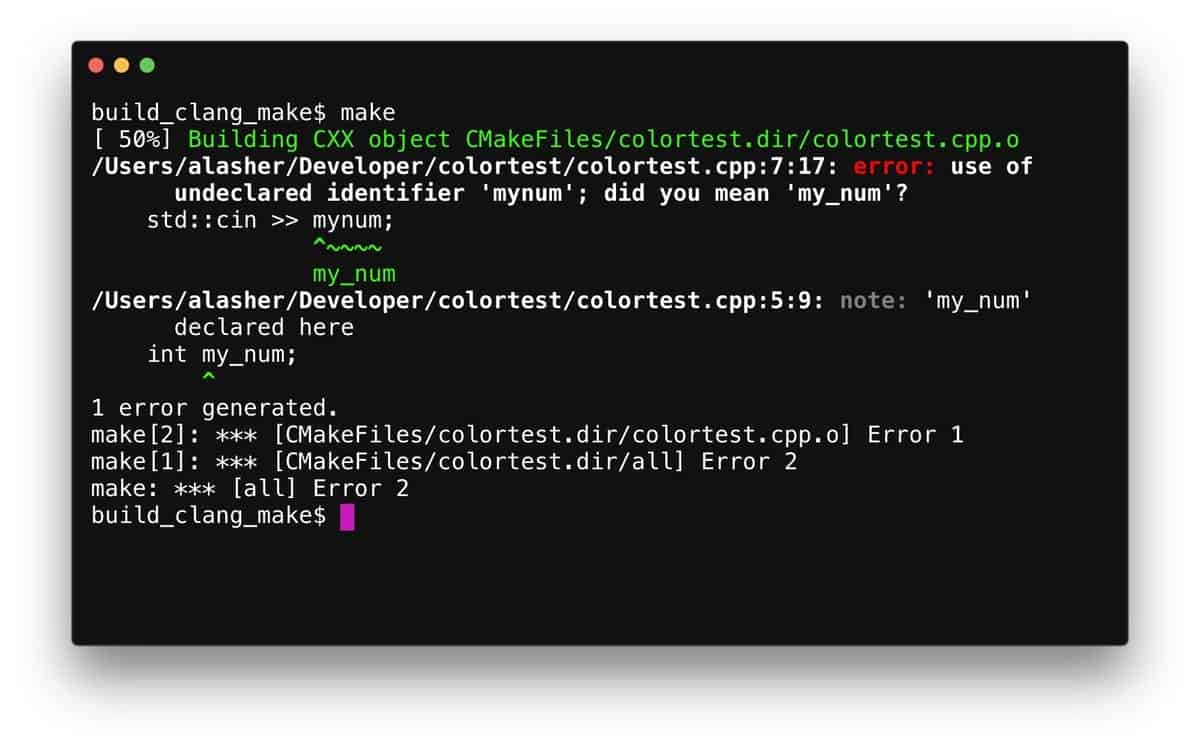
Features of Clang
- Clang is known for its fast compilation time and superior performance compared to traditional Linux compilers.
- The modular, plugin-based architecture of this project makes Clang extremely customizable and requires limited CPU resources.
- It comes out with an LLVM-BSD license that is compatible with enterprise products while still providing the source freely.
- Clang’s lightweight memory footprint makes it a perfect choice for creating programs in resource-constrained machines.
12. Intel Fortran Compiler
The Intel Fortran Compiler, or IFORT, is a family of extremely powerful Fortran compilers for Intel hardware. It comes with many lucrative feature sets that make program optimization very easy.
Most of these Fortran compilers can effectively pre-process, compile, assemble, and link Fortran applications on both IA-32 and Intel 64 systems.
No matter if you’re a researcher or a developer who is maintaining a legacy codebase, IFORT is certainly one of the best Linux Compilers you can get.
Features of Intel Fortran Compiler
- It is a cross-platform Fortran compiler and offers excellent integration with traditional Unix IDEs like Eclipse & Xcode.
- IFORT is designed to leverage multicore architecture features like SIMD vectorization, automatic parallelism, and co-arrays.
- The compliant compiler of this suite supports all features of Fortran 66, 77, 90, 95, 2003, and 2008, alongside many 2018 functionalities.
- Most of these Fortran compilers can work with Windows API, POSIX, OpenGL, Component Object Model(COM), and GDB.
Download Intel Fortran Compiler
13. FreeBASIC
BASIC was a popular language of its time known for its ease of use. Many legacy applications still utilize this multi-paradigm programming language. FreeBASIC is a simple yet feature-rich compiler for the BASIC and QBasic programming languages.
It is an open-source project that comes under the GNU GPL license and supports all major Unix platforms, including Linux and FreeBSD.
This BASIC compiler is also used to develop programs for the MS-DOS and Xbox platforms. However, official support for Xbox has been deprecated.
Features of FreeBASIC
- This 32-bit BASIC compiler also provides the necessary assembler, linker, and archiver and utilizes the GNU Binutils toolchain as its backend.
- FreeBASIC is a self-hosting compiler and provides many popular libraries such as SDL, OpenGL, GTK, and the C standard library.
- Developers can quickly build graphical programs by utilizing DirectX in Windows or OpenGL in Linux-based machines.
- FreeBASIC offers a command-only interface by default but can be used from within traditional Linux IDEs.
14. Scala Native
Scala Native is a simple but extremely effective compiler for the functional programming language Scala. It is an AoT(Ahead-of-Time) compiler that can optimize your code to a great extent.
Scala Native is a fairly modern compiler that has built-in support for higher-level abstractions, type-checking, and immutable data structures. This makes it a very safe compiler for developing modern-day software solutions at ease.
Instead of providing native Java or Scala libraries, Scala Native implements its personalized implementation of JDK.
Features of Scala Native
- Scala Native offers excellent out-of-the-box support for existing Scala IDEs and seamless integration with standard build tools.
- This Scala compiler utilizes the LLVM backend for generating intermediate representations, which increases performance based on machines.
- It is built as a cross-publishing infrastructure against the JVM(Java Virtual Machine), JavaScript runtime, and Native platforms.
- The open-source nature of this compiler allows developers to extend the software or make essential modifications as required.
15. CodeChef Online IDE
Online Linux compilers provide a handy way of testing programs without installing language-specific compilers. CodeChef is a popular website that hosts competitive programming contests and provides a compelling online compilation suite.
The CodeChef online IDE makes it easy to test newer technologies from the comfort of your home machine without even installing the bare minimum. The IDE loads up pretty fast and offers a seamless graphical experience to Linux users.
So, we highly suggest you check this online IDE if you like to try newer programming languages.
Features of CodeChef Online IDE
- The CodeChef Online IDE supports various runtimes and compilers, including GCC, GHC, Rust, Scala, GFortran, and Bash.
- Developers can upload existing program codes very easily using the intuitive file upload feature of this online Linux compiler.
- Most of the compilers of this online suite provide skeleton codes to save developers time and help new users.
- Users can configure the graphical experience they’re seeing by changing the fonts, tabs, themes, and soft wraps.
16. Steel Bank Common Lisp
The Steel Bank Common Lisp, or SBCL, is a high-performance Linux compiler for the ANSI Common Lisp language. It is an outstanding compiler with features for debugging, optimization, profiling, and many more.
If you’re a Lisp developer working with resource-intensive enterprise applications, SBCL is certainly a feasible choice for you. This Lisp compiler is available on all major platforms that support Linux, such as x86, AMD64, and ARM-based machines. PC users can also run this compiler in most BSD systems.
Features of Steel Bank Common Lisp
- SBCL provides both the runtime and compiler for the ANSI Common Lisp dialect and is a direct fork of the Carnegie Mellon University Common Lisp.
- This is an entirely open-source project with a permissive license that enables further modification of the compiler without any hassle.
- SBCL offers excellent debugging features, which make it easy to track down bugs in your code and optimize programs.
- The official documentation provides an in-depth knowledge of this Lisp compiler and available functionalities.
17. JDoodle
JDoodle is another excellent online Linux compiler for home users. It offers support for a massive range of languages as well as databases. JDoodle supports peer programming, so it’s a great choice for teams that work remotely. Programmers can very quickly write or compile their code and share their programs with the community.
Moreover, this online application has an intuitive web interface, which makes it effortless to use and navigate. So, you should certainly check out JDoodle if you’re looking for a simple online compiler.
Features of JDoodle
- JDoodle supports more than 70 different programming languages, such as C, C++, Java, Python, Perl, Ruby, Haskell, Kotlin, JavaScript, and so on.
- Programmers can choose from a number of compiler and their versions, including GCC 9.1.0, 8.1.0, 7.2.0, 5.3.0, and Zapcc 5.0.0.
- It is easy to download the codes you write, and you can also embed them in blog posts or share them via a simple, shareable link.
- Developers can integrate JDoodle into their projects using the robust REST APIs provided by this online compiler.
18. CHICKEN
CHICKEN is a modern-day Linux compiler for the Scheme programming language. It is essentially a compiler and interpreter that implements many useful features of Scheme programmers. CHICKEN can convert scheme source to C code very effectively and is extremely portable.
This is a fairly lightweight Scheme compiler that is fully compliant with the R5RS and partially compliant with the R7RS standard. If you’re looking for a simple Scheme compiler with a plethora of standard features, we highly suggest you test CHICKEN.
Features of CHICKEN
- CHICKEN can produce portable & efficient C code for a number of platforms and runs on Linux, BSD, OS X, and Windows.
- The compiler is pretty lightweight due to its limited dependencies and only requires the GNU make and a C toolchain.
- Developers can create their own extensions or choose from a wide selection of ready-made libraries and extensions.
- CHICKEN comes with an empowering BSD license that allows restriction-free modification of the compiler.
19. Small Device C Compiler
The Small Device C Compiler is a handy Linux compiler program that allows developers to build programs for 8-bit microcontrollers. It contains a simulator, assembler, linker, and debugger for ease of development.
This is, without any doubt, one of the best Linux compilers for Intel 8051-compatible microcontrollers. It already supports a robust set of microcontroller architectures and is adapting newer hardware quite often.
So if you are looking for a simple but effective compiler for your embedded projects, this can be an ideal solution.
Features of Small Device C Compiler
- It supports Linux, Mac OS, and Windows hosts and can be used for targeting derivatives of Intel MCS51, Freescale, Padauk, and STMicroelectronics STM8 devices.
- Small Device C Compiler provides built-in support for a wide selection of automated regression tests and monitoring features.
- The adaptable MCU-specific backend allows greater optimization of your code based on the target device.
- Small Device C Compiler is very well-maintained and offers excellent documentation for starting microcontroller programmers.
Download Small Device C Compiler
20. javac
javac is the de-facto compiler for the Java programming language and is a core component of the standard Java Development Kit (JDK). It accepts programs that adhere to the Java language specification (JLS) and produces bytecodes using the Java Virtual Machine Specification (JVMS).
The compiler itself is written using Java and allows developers to invoke this from their applications. This has become a widely accepted tool for Java programmers due to its robust feature set and powerful command-line controls.
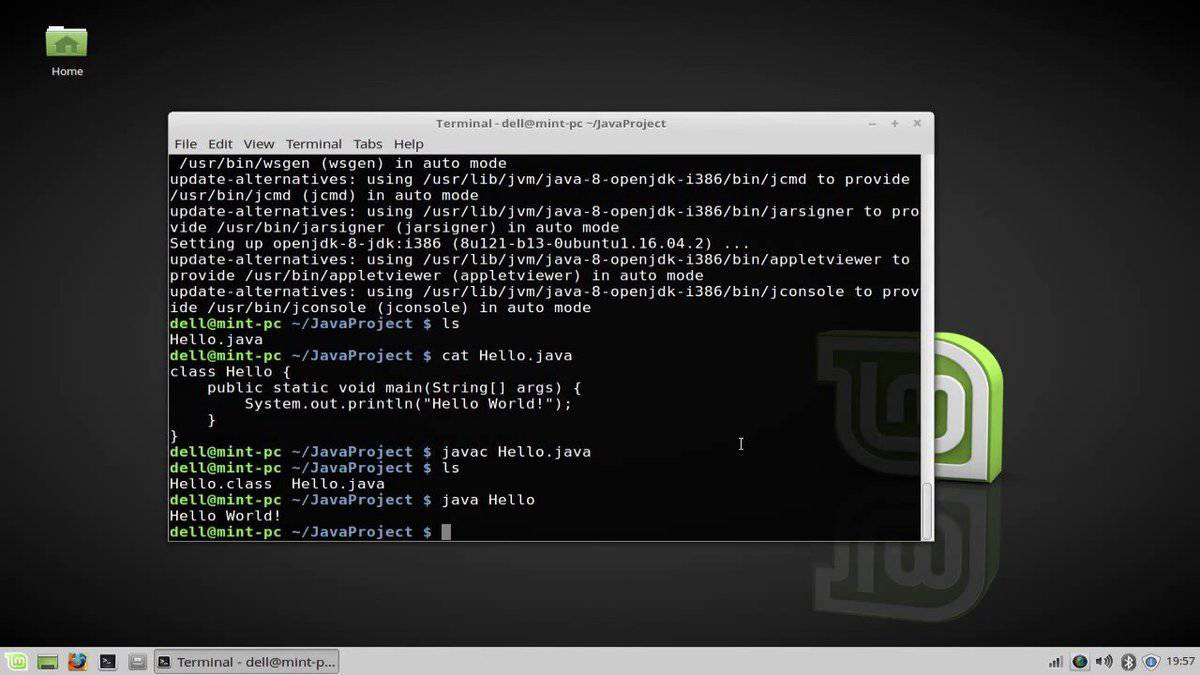
Features of javac
- javac compiles .java source files into intermediate Java bytecodes, which are used for generating machine-dependent native code.
- This Java compiler supports a wide range of standard and cross-compilation options to help produce more optimized bytecode representations.
- It can be found as a standard feature in most Java development tools like the Netbeans IDE and IntelliJ IDEA.
- Developers can quickly adapt to the Javac compilers by utilizing high-quality official documentation.
21. Online GDB
Online GDB is an awesome online Linux compiler for a wide range of programming languages. It also works as an online debugger and allows developers to write optimized code.
Online compilers like this often come in handy when you’re on a different system or simply don’t want to install development tools for some reason. You can easily write good programs using Online GDB and run programs in both interactive and console modes.
So definitely check out this compiler if you’re after online IDEs.
Features of Online GDB
- Developers can write codes, compile them, run and debug programs as well, and share the source with their friends or colleagues.
- It allows users to supply any command-line arguments for their program using an interactive form and supports an interactive console.
- Online GDB now supports a lot of popular programming languages like C, C++, PHP, Python, Perl, Java, C#, Fortran, Haskell, Assembly, and so on.
- It enables programmers to upload existing code using its file upload feature and also download any code they write.
22. FASM
FASM, or Flat Assembler, is an old-school Linux assembler that is still relevant due to its robust feature set and fast performance. This assembler is aimed at X86-based microprocessors and can deal with Intel-style assembly language on the X86-64 platform very well.
Developers like FASM due to its simple design but tremendous power. It allows them to gain extreme size optimizations without increasing the runtime at all. If you’re working with legacy assembly programs that require further optimizations, give this one a try.
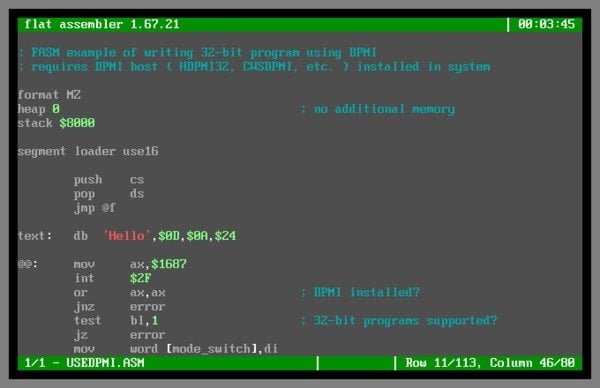
Features of FASM
- It is a multi-pass assembler that provides extensive size optimizations and limitless forward referencing.
- Since FASM itself is written using assembly, you can use this tool to bootstrap or reverse engineer itself.
- FASM allows developers to create custom macros for integrating multiple instructions into a single larger instruction.
- It runs on Linux, BSD, and DOS systems and supports traditional SIMD extensions such as MMX, AVX, and SSE.
23. Bigloo Compiler
Bigloo is a scheme runtime that contains a competitive Linux compiler for the programming language Scheme. It is a family of Lisp dialects that are commonly used today. The Bigloo compiler can generate C code and bytecodes for the JVM and .NET.
It provides an extended C interface that allows developers to leverage powerful C libraries with ease. On the other hand, Bigloo can be used for pointing to Java structures and provides a robust object-oriented layer on top of it.
Features of Bigloo Compiler
- Bigloo complies with the R5RS standard and implements features like hygienic macros, script interpreters, and dynamic protectors.
- The object-oriented layer of Bigloo enables developers to access and implement mutation functions in instances using their classes.
- Bigloo utilizes well-known tools like Lex and Yacc to control the input/output of your programs more practically.
- It comes with ready-made support for SQL databases and provides a C-based SQLite binding.
24. ispc
The Intel SPMD Program Compiler, or ispc, is one of the best Linux compilers for SPMD(Single Program Multiple Data) programming. This is an advanced technique for implementing parallelism in your programs and better utilizing the extra number of cores present in modern Intel chipsets.
Developers can write C programs for SPMD and leverage ispc to produce high-performing binaries. You can also use this compiler to optimize programs effortlessly. Overall, ispc is an excellent solution for programmers who deal with SPMD programs.
Features of ispc
- Intel SPMD Program Compiler uses LLVM as its backend and can run on most systems on the x86/x86-64 platform.
- It comes with pre-built support for the instruction sets AVX1, AVX2, AVX512, SSE2, SSE4, and Xeon Phi.
- The open-source BSD license of ispc encourages developers to extend or modify the source code as they see fit.
- It increases program performance by effectively scaling core numbers and vector unit size.
Ending Thoughts
Since many powerful Linux compilers are available, developers often find it hard to choose the best one for their project. We have outlined the 24 best offline and online Linux compilers here to help you choose the appropriate solution for your development tasks.
You will need to take many things into consideration, like the target platform of your program, availability of resources, level of optimization, and so on. Some of the tools mentioned in this guide are used universally for a wide range of development jobs.
The GNU Compiler Collection, alongside the LLVM, Clang, and Babel compilers are some of the most popular.
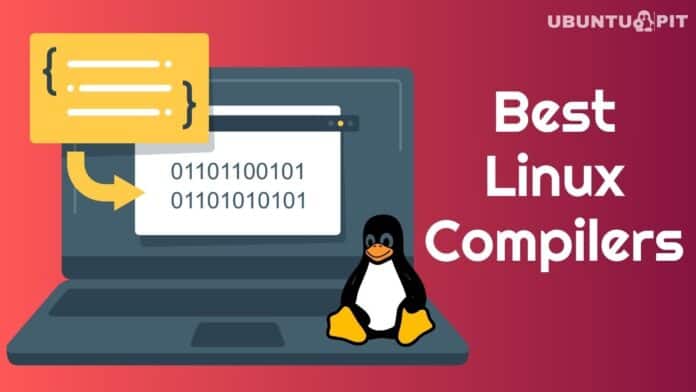
Hello Mehendi, I am Steve from Perth, Australia. The weather at the moment is Mid Summer5 with the associated 40+ C temperatures.
I could not let it pass without letting you know that your article on compilers is very good. You obviously did a lot of research. I really enjoyed your piece.
Kindest Regards
Steve..